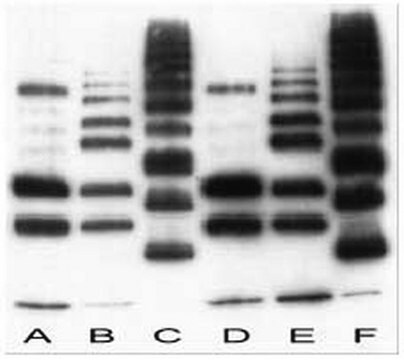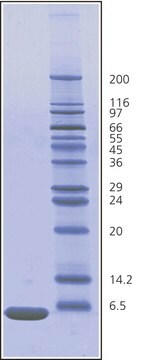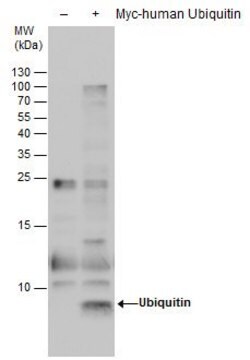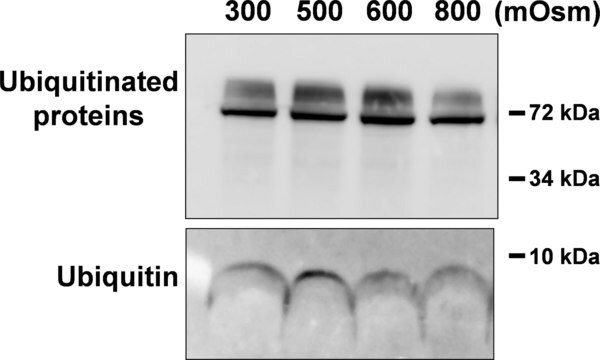04-262
Anti-Ubiquitinylated proteins Antibody, clone FK1
clone FK1, Upstate®, from mouse
Sign Into View Organizational & Contract Pricing
All Photos(1)
About This Item
UNSPSC Code:
12352203
eCl@ss:
32160702
NACRES:
NA.41
Recommended Products
biological source
mouse
Quality Level
antibody form
purified immunoglobulin
antibody product type
primary antibodies
clone
FK1, monoclonal
species reactivity (predicted by homology)
all
manufacturer/tradename
Upstate®
technique(s)
immunohistochemistry: suitable
western blot: suitable
isotype
IgM
shipped in
wet ice
target post-translational modification
unmodified
General description
Ubiquitin is a polypeptide of 76 amino acid residues, being a very highly conserved and widely distributed protein in all eukaryotic cells. It has been proposed that ubiquitin plays important roles in various biological processes such as the regulation of cell cycle, DNA replication, DNA repair, stress response, apoptosis, signal transduction, and the biogenesis of ribosome, nucleosome, peroxisome and myofibrils. In these processes, ubiquitin functions as both a signal for protein degradation and as a chaperone promoting the formation of organelles.
Specificity
Recognizes only poly-ubiquitinylated proteins and not mono-ubiquitinylated proteins or free ubiquitin.
Immunogen
Poly-ubiquitinylated-lysozyme.
Application
Anti-Ubiquitinylated proteins Antibody, clone FK1 is an antibody against Ubiquitinylated proteins for use in WB, IH.
Research Category
Protein Trafficking
Protein Trafficking
Research Sub Category
Ubiquitin & Ubiquitin Metabolism
Ubiquitin & Ubiquitin Metabolism
Physical form
100 µL of concentration 1mg/mL purified immunoglobulin in PBS containing 0.1% sodium azide. Dilute to working strength with phosphate buffered saline pH 7.2-7.4.
Format: Purified
Storage and Stability
Stable for 1 year at 2-8°C from date of shipment for up to 12 months.
Other Notes
Concentration: Please refer to the Certificate of Analysis for the lot-specific concentration.
Legal Information
UPSTATE is a registered trademark of Merck KGaA, Darmstadt, Germany
Disclaimer
Unless otherwise stated in our catalog or other company documentation accompanying the product(s), our products are intended for research use only and are not to be used for any other purpose, which includes but is not limited to, unauthorized commercial uses, in vitro diagnostic uses, ex vivo or in vivo therapeutic uses or any type of consumption or application to humans or animals.
Not finding the right product?
Try our Product Selector Tool.
Storage Class Code
10 - Combustible liquids
WGK
WGK 2
Flash Point(F)
Not applicable
Flash Point(C)
Not applicable
Certificates of Analysis (COA)
Search for Certificates of Analysis (COA) by entering the products Lot/Batch Number. Lot and Batch Numbers can be found on a product’s label following the words ‘Lot’ or ‘Batch’.
Already Own This Product?
Find documentation for the products that you have recently purchased in the Document Library.
Chris McKinnon et al.
Acta neuropathologica, 131(3), 411-425 (2015-12-10)
Prion diseases are a group of fatal neurodegenerative disorders characterised by the accumulation of misfolded prion protein (PrP(Sc)) in the brain. The critical relationship between aberrant protein misfolding and neurotoxicity currently remains unclear. The accumulation of aggregation-prone proteins has been
Kaisa Haglund et al.
Nature cell biology, 5(5), 461-466 (2003-04-30)
Many cellular proteins are post-translationally modified by the addition of a single ubiquitin or a polyubiquitin chain. Among these are receptor tyrosine kinases (RTKs), which undergo ligand-dependent ubiquitination. The ubiquitination of RTKs has become recognized as an important signal for
Hugues Lelouard et al.
Nature, 417(6885), 177-182 (2002-05-10)
Dendritic cells (DCs) are antigen-presenting cells with the unique capacity to initiate primary immune responses. Dendritic cells have a remarkable pattern of differentiation (maturation) that exhibits highly specific mechanisms to control antigen presentation restricted by major histocompatibility complex (MHC). MHC
z-Leucinyl-leucinyl-norleucinal induces apoptosis of human glioblastoma tumor-initiating cells by proteasome inhibition and mitotic arrest response.
Monticone M, Biollo E, Fabiano A, Fabbi M, Daga A, Romeo F, Maffei M, Melotti A et al.
Molecular Cancer Research null
Miao Li et al.
Methods in molecular biology (Clifton, N.J.), 1436, 85-94 (2016-06-02)
Histone deacetylase 6 (HDAC6) is a member of class IIb HDAC family. HDAC6 exists predominantly in the cytoplasm and deacetylates mainly non-histone proteins in the cytoplasm. Via its deacetylase and ubiquitin binding domains, HDAC6 regulates microtubules, cytoskeleton, intracellular trafficking, and
Our team of scientists has experience in all areas of research including Life Science, Material Science, Chemical Synthesis, Chromatography, Analytical and many others.
Contact Technical Service






